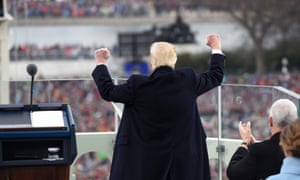Extract from The Guardian
Like
almost everything that emanates from Trump, his inaugural address was
mocking, belligerent and triumphalist. It resembled an extended tweet.
His America is one of dystopian wreckage, a vision of betrayal and
decay.
In his paranoid theory, a monolithic “establishment protected itself” while deliberately creating a system of exploitation intent on helping foreigners. Following this plot, foreign industry was “enriched,” foreign armies were “subsidized,” other nations’ borders were “defended,” and “trillions” were siphoned into foreign aid. “We’ve made other countries rich while the wealth, strength, and confidence of our country has disappeared over the horizon.”
Thus, on 20 January 2017, an American president proclaimed the coda of the American Century. But he went further than just tolling its end: he extolled its demise.
His American Carnage speech was his counterpoint to President John F Kennedy’s confident inaugural address that articulated the first principles of the American Century. Trump’s call for “America First” rebuked Kennedy’s call to a transatlantic alliance in “a host of cooperative ventures,” to “our sister republics south of the border” for a “new alliance for progress,” and to defend international human rights and democracy “to break the bonds of mass misery.”
In his paranoid theory, a monolithic “establishment protected itself” while deliberately creating a system of exploitation intent on helping foreigners. Following this plot, foreign industry was “enriched,” foreign armies were “subsidized,” other nations’ borders were “defended,” and “trillions” were siphoned into foreign aid. “We’ve made other countries rich while the wealth, strength, and confidence of our country has disappeared over the horizon.”
Thus, on 20 January 2017, an American president proclaimed the coda of the American Century. But he went further than just tolling its end: he extolled its demise.
His American Carnage speech was his counterpoint to President John F Kennedy’s confident inaugural address that articulated the first principles of the American Century. Trump’s call for “America First” rebuked Kennedy’s call to a transatlantic alliance in “a host of cooperative ventures,” to “our sister republics south of the border” for a “new alliance for progress,” and to defend international human rights and democracy “to break the bonds of mass misery.”
Kennedy accepted national sacrifice for a greater global cause that he knew from his own experience was essential to American security. His understanding came from his distillation of the consequences of American isolationism that had kept the US out of the League of Nations after World War I and nearly prevented President Franklin D Roosevelt from providing urgent Lend Lease aid to beleaguered Britain facing Nazi Germany alone. With the knowledge of that history, it would have been a shock to JFK to hear another inaugural address declaring, “America First.”
The dark pessimism and conspiracism of Trump’s speech are unoriginal with him. They are crude echoes of the old themes of American isolationism. Trump’s slogan, “America First,” was emblazoned on the banner of the movement for appeasement of Hitler.
Charles Lindbergh, the famed aviator, its chief spokesman, delivered a notorious speech to the America First Committee just eleven days after Hitler invaded Poland and launched World War II in 1939, which described “an over-increasing effort to force the United States into the conflict,” “carried on by foreign interests, and by a small minority of our own people.” Lindbergh identified the enemies of American “independence and freedom”: “The three most important groups who have been pressing this country toward war are the British, the Jewish and the Roosevelt administration.”
After Pearl Harbor, the America First Committee disbanded. And after the war, the Republican Party in its support for the Atlantic alliance and Nato defeated once and for all its isolationist wing. But the slogan was exhumed during the Republican primary contest of 1992.
Patrick Buchanan, a former far-right aide to presidents Nixon and Reagan, running against President George H W Bush, declared: “Make America First again.” Buchanan was quite conscious of the history and saw himself as the restorer of a discredited past.
Trump has little if any of Buchanan’s sense of history. Yet standing on the West Portico of the Capitol, on the spot where John F Kennedy spoke 56 years ago, he unfurled the slogan of Lindbergh and Buchanan as the mission of his presidency.
“Let every nation know, whether it wishes us well or ill, that we shall pay any price, bear any burden, meet any hardship, support any friend, oppose any foe, in order to assure the survival and the success of liberty.”
Goodbye to all that.
Some observers have suggested in trepidation of Trump’s rise the relevance of Hannah Arendt’s The Origins of Totalitarianism. But at least the title of another volume by Arendt captures the tone of his inaugural address – The Banality of Evil.

No comments:
Post a Comment